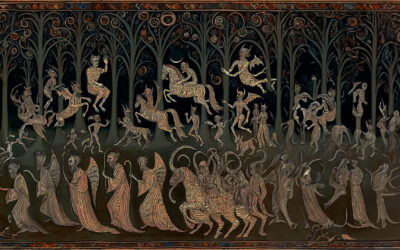Contents
Introduction
The 14th of February has for more than half a millennia been associated with love. But the day we call Saint Valentine’s is rather a commemoration of the death of a martyr. Today, we are reading Jacobus de Voragine’s chapter on Saint Valentine in our Latin video Book Club.
Saint Valentine, or Valentinus in Latin, was a Roman saint, 3rd century a martyr.
There are several vitae – biographies – written about him, and there are numerous stories connected with him. He was a priest, or a bishop, or neither. You see, there might have been three Saint Valentines. All three, however, traditionally suffered martyrdom on the 14th of February. (and the official list of Saints only recognizes that there is one Saint Valentine).
As mentioned, there are several Vitae Valentini. Today, the one we will read comes from one of the most famous and popular hagiographical works of history: Legenda Aurea.
Legenda Aurea, or Legenda Sanctorum, known to the Anglo-Saxon speaking world as the Golden Legend, is a compilation of Saints’ lives, written by Jacobus de Voragine during the mid 13th century.
Jacobus de Voragine, or Varagine as early sources call him (or Giacomo de Varazza as his Italian name would be), was the archbishop of Genua and a diligent writer who not only composed Legenda Aurea but a collection of Sermons and the History of Genua.
His Legenda Aurea became exceedingly popular and widely read in Europe during the late Middle Ages. When printing took off in the middle of the 15th century, the Golden Legend was soon published across Europe, not only in its original Latin but translations in Catalan, French, Italian, Czech, German, and English followed suit. It soon became one of the most printed books of the time.
The brief account of Saint Valentine as found in Legenda Aurea focus on the end of his life.
Video in Latin
Audio only
Listen in your podcast app or here on Latinitium.com
More Saint Valentine?
If you just can’t get enough of Valentine or if you are curious about what other legends are told about him, you will find more in the Latin learning app Legentibus. There you will find the book Tres Vitae Sancti Valentini with three Vitae about Valentine in Latin.
You will also find Sanctus Valentinus a Novella /Story in Easy Latin for Beginners written by our own Daniel Pettersson. This story is based on the vitae connected to Saint Valentine, but written with Latin learning beginners in mind. The book is a so-called Read-Along which means you will get both audio and text combined (along with an English translation and notes on the text). The book is a free resource, open for everyone.
You will find Legentibus here.
Latin Text: De Sancto Valentino, Legenda Aurea Jacobi de Voragine
‘Valentinus’ dicitur quasi ‘valorem tenens’, hoc est, in sanctitate perseverans. Vel dicitur ‘Valentinus’, quasi ‘valens tyro’, id est, miles Christi. Miles dicitur valens, qui nunquam cecidit, fortiter ferit, se valenter defendit, potenter vincit. Sic Valentinus non cessit martirium vitando, percussit idololatriam evacuando, defendit fidem communiendo, vicit patiendo.
Valentinus reverendus presbyter fuit, quem Claudius imperator ad se adduci faciens interrogavit dicens: “quid est Valentine? Cur amicitia nostra non frueris, ut Deos nostros adores et superstitionem tuae abjicias vanitatis?” Cui Valentinus: “Si gratiam Dei scires, ista nequaquam diceres, sed ab idolis animum revocares et Deum, qui est in caelis, adorares.”
Tunc quidam, qui Claudio adstabat, dixit: “Quid vis dicere, Valentine, de sanctitate Deorum nostrorum?” Cui Valentinus: “Ego de iis nil dico, nisi quod fuerunt homines miseri et omni immunditia pleni. Ad quem Claudius: “Si Christus verus Deus est, cur mihi non dicis, quod verum est?” Cui Valentinus: “Vere Christus solus est Deus, in quem si credideris, anima tua salvabitur, respublica augebitur, omnium inimicorum tibi victoria concedetur.”
Respondens autem Claudius adstantibus dixit: “Viri Romani, audite, quam sapienter et recte homo loquitur iste.” Tunc dixit praefectus: “Seductus est imperator! Quomodo deseremus, quod ab infantia tenuimus?”
Et tunc cor Claudii immutatum est. Traditur autem cuidam principi in custodiam et, cum in domum ejus ductus fuisset, dixit: “Domine Jesu Christe, verum lumen, illumina domum istam, ut te verum Deum cognoscant.” Cui praefectus: “Miror te dicentem, quod Christus est lumen. Equidem, si filiam meam, diu caecam, illuminaverit, faciam, quaecumque praeceperis.” Tunc Valentinus orans, ejus filiam caecam illuminavit et omnes de domu sua convertit.
Tunc imperator Valentinum decollari praecepit circa annum domini CCLXXX.
English Translation: The Life Of S. Valentine, The Golden Legend
Valentine is as much to say as containing valour that is perseverant in great holiness. Valentine is said also as a valiant knight, for he was a right noble knight of God, and the knight is said valiant that fleeth not, and smiteth and defendeth valiantly and overcometh much puissantly. And so S. Valentine withdrew him not from his martyrdom in fleeing, he smote in destroying the idols, he defended the faith, he overcame in suffering.
Of S. Valentine the Martyr.
S. Valentine, friend of our Lord and priest of great authority, was at Rome. It happed that Claudius the emperor made him to come before him and said to him in demanding: What thing is that which I have heard of thee, Valentine? Why wilt thou not abide in our amity, and worship the idols and renounce the vain opinion of thy creance? S. Valentine answered him: If thou hadst very knowledge of the grace of Jesu Christ thou shouldest not say this that thou sayest, but shouldest reny the idols and worship very God. Then said to S. Valentine a prince which was of the council of the emperor: What wilt thou say of our gods and of their holy life? And S. Valentine answered: I say none other thing of them but that they were men mortal and mechant and full of all ordure and evil. Then said Claudius the emperor: If Jesu Christ be God verily, wherefore sayst thou not the truth? And S. Valentine said: Certainly Jesu Christ is only very God, and if thou believe in him, verily thy soul shall be saved, thy realm shall multiply, and he shall give to thee always victory of thine enemies. Then Claudius turned him unto all them that were there, and said to them: Lords, Romans, hear ye how wisely and reasonably this man speaketh? Anon the provost of the city said: The emperor is deceived and betrayed, how may we leave that which we have holden and been accustomed to hold sith our infancy? With these words, the emperor turned and changed his courage, and S. Valentine was delivered in the keeping of the provost.
When S. Valentine was brought in an house in prison, then he prayed to God, saying: Lord Jesu Christ very God, which art very light, enlumine this house in such wise that they that dwell therein may know thee to be very God. And the provost said: I marvel me that thou sayest that thy God is very light, and nevertheless, if he may make my daughter to hear and see, which long time hath been blind, I shall do all that thou commandest me, and shall believe in thy God. S. Valentine anon put him in prayers, and by his prayers the daughter of the provost received again her sight, and anon all they of the the house were converted. After, the emperor did do smite off the head of S. Valentine, the year of our Lord two hundred and eighty. Then let us pray to S. Valentine that he get us pardon of our sins. Amen.
Translated by William Caxton, First Edition 1483 and edited by F.S. Ellis, 1900.
















